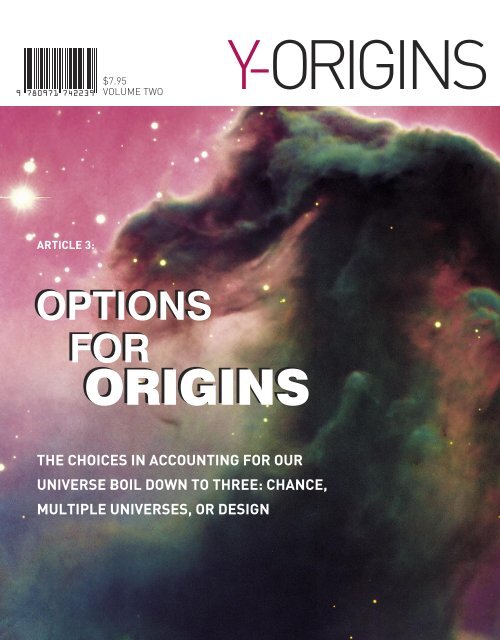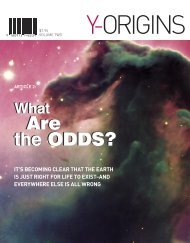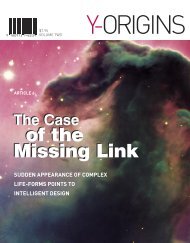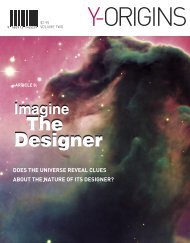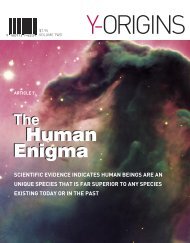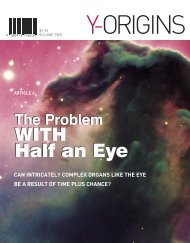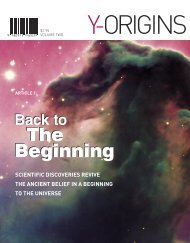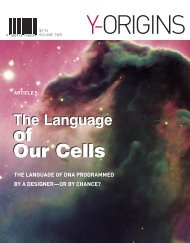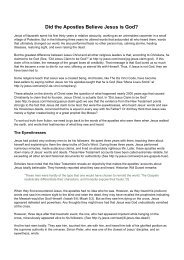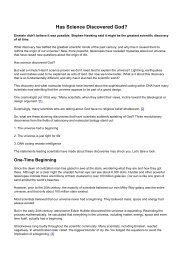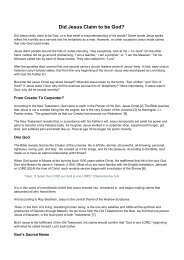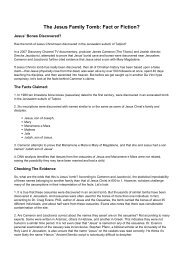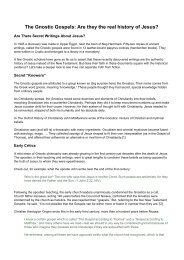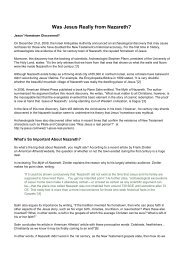Origins3
Create successful ePaper yourself
Turn your PDF publications into a flip-book with our unique Google optimized e-Paper software.
$7.95<br />
VOLUME TWO<br />
Y-ORIGINS<br />
ARTICLE 3:<br />
OPTIONS<br />
FOR<br />
ORIGINS<br />
THE CHOICES IN ACCOUNTING FOR OUR<br />
UNIVERSE BOIL DOWN TO THREE: CHANCE,<br />
MULTIPLE UNIVERSES, OR DESIGN
INSTRUCTIONS<br />
To view the layout and graphics, click on the Facing icon on the<br />
right side of your bottom tool bar in your Acrobat Reader © file. Try viewing at 75%.<br />
To read the article, click on the Single Page icon on the bottom right of your<br />
Acrobat Reader © file.<br />
To enlarge the print for easier viewing, click on the “+” by the<br />
magnifcation percentage in the middle of the tool bar at the top of the page.<br />
To move from one page to another, use your side scroll bar or click on the<br />
left or right arrow in the bottom tool bar.<br />
CLICK HERE to see other articles from Y-Jesus Magazine at www.y-zine.com<br />
Chief Editor: Larry Chapman<br />
Project Coordinator: Helmut Teichert<br />
Editorial Director: Rick James<br />
Design: Hydragraphik ® Studio ( www.hydragraphik.com )<br />
Sun Mountain Productions<br />
Article Editors: Rick James, Eric Stanford<br />
Copy Editor: Eric Stanford<br />
Writers: Larry Chapman, Rick James, Eric Stanford<br />
Y-ZINE<br />
PO Box 6017<br />
Great Falls, MT 59405<br />
Copyright 2006 by Bright Media Foundation and B & L Publications. All rights reserved.<br />
ISBN 0-9717422-3-5<br />
2 • Y-JESUS
Options for Origins<br />
Click on the e-article title for contents<br />
THE COICE IN ACCOUNTING FOR OUR UNIVERSE<br />
BOIL DOWN TO THREE: CHANCE, MULTIPLE<br />
UNIVERSES OR DESIGN Page 6<br />
LUCKY YOU Page 6<br />
ADD-ON UNIVERSES Page 7<br />
IMAGINARY TIME, IMAGINARY UNIVERSES? Page 7<br />
HANDMADE UNIVERSE Page 9<br />
TO HUME IT MAY CONCERN Page 9<br />
THE ANTHROPIC PRINCIPLE Page 11<br />
ENDNOTES Page 11<br />
THE LAGOON NEBULA Page 12<br />
THE RING NEBULA [M57] “THE EYE OF GOD” Page 13<br />
STARS IN THE TARANTULA NEBULA Page 13<br />
ULTRAVIOLET LIGHT SOURCE<br />
FROM AN ANCIENT GALAXY Page 13<br />
ACKNOWLEDGMENTS<br />
I am indebted to Dr. Bill Bright, who passed away before this project was finished. Dr. Bright enthusiastically endorsed and<br />
contributed to the development of the material presented in this endeavor.<br />
Special thanks are also due to Rick James and Eric Stanford, who have both spent countless hours clarifying some of the concepts<br />
presented.<br />
Several others have contributed greatly to the writing of these articles, including Dr. Henry Brandt, Dave Chapman, Dr. Bert<br />
Harned, and New Testament scholar, Dr. Ron Heine. The valuable input from Brian Ricci, ‘Jamin Latvala, and the Campus Crusade<br />
staff at the University of Washington were especially helpful and constructive. Special thanks also are due Helmut Teichert of<br />
Bright Media, who has been the overall director of the project. Finally I would like to thank my wife, Marianne, for inspiring me to<br />
undertake this effort.<br />
Larry Chapman<br />
TABLE OF CONTENTS • 3
OPTIONS FOR<br />
ORIGINS<br />
The choices in accounting for our<br />
universe boil down to three: chance,<br />
multiple universes, or design<br />
4 • OPTIONS FOR ORIGINS • ARTICLE 3
OPTIONS FOR ORIGINS • ARTICLE 3• 5
Scientists are looking at the extreme rarity<br />
of life in our universe and asking, “why are<br />
we so lucky?” At some point you’ve got to<br />
step back from the facts and ask the question<br />
“So what does all this fine-tuning add<br />
up to?”<br />
Example:<br />
A university student who’s just trying to<br />
get a passing grade might be satisfied with<br />
loading up his short-term memory with the<br />
data he’s received. But a student who is<br />
actually planning to use this information<br />
in a career, or for personal enrichment, has<br />
to spend some time thinking about the<br />
subject’s actual meaning.<br />
Same thing with the question of how quasars,<br />
Pluto, and you got here.<br />
The evidences for the fine-tuning of the<br />
universe to permit life to exist on one medium-sized<br />
planet, third from the left, are<br />
mounting. Many scientists are speaking in<br />
theological terms about what they see as<br />
clear evidence for design.<br />
If you were to survey the writings of leading<br />
scientists such as Hawking, Penrose, Davies,<br />
and Greene, you would find that there<br />
are three options being offered for<br />
our origins.<br />
• The fine-tuning of the universe is<br />
merely a coincidence.<br />
• There are other universes, improving<br />
the odds of life.<br />
• The universe has been designed.<br />
LUCKY<br />
YOU<br />
Some materialists attribute the fine-tuning<br />
of the universe to chance. In Alpha &<br />
Omega, Charles Seife summarizes how<br />
some view the fine-tuning: “It seems like a<br />
tremendous coincidence that the universe<br />
is suitable for life.” 1<br />
Cosmologists Bernard Carr and Sir Martin<br />
Rees state in the journal Nature, “Nature<br />
does exhibit remarkable coincidences and<br />
these do warrant some explanation.” 2 In a<br />
later article Carr comments, “One would<br />
have to conclude either that the features<br />
of the universe invoked in support of the<br />
Anthropic Principle are only coincidences<br />
or that the universe was indeed tailor-made<br />
for life. I will leave it to the theologians to<br />
ascertain the identity of the tailor.” 3<br />
In other words, as a scientist, I don’t<br />
get into religion, so I assume it was all a<br />
lucky break. Scientists who subscribe to a<br />
materialistic world view simply can’t bring<br />
themselves to accept the intervention of an<br />
intelligent designer who orchestrated the<br />
creation of the universe. Therefore, faced<br />
with all the evidence for fine-tuning, they<br />
default to the position that it was all just a<br />
coincidence.<br />
There is, however, a defense often raised<br />
by those who take the viewpoint that life,<br />
and the fine-tuning of the universe, are just<br />
amazing coincidences. It goes like this:<br />
Whatever shape the universe took, one<br />
could look at the sequence of events and<br />
say that it was just as unlikely that the universe<br />
should have developed in that way.<br />
In other words, every state of affairs, from a<br />
certain viewpoint, has astronomical odds of<br />
its eventuating just the way it did. So why<br />
should we really be amazed that we won<br />
life’s cosmic lottery? Somebody had to.<br />
Let’s consider how I lived out my day today<br />
as an example of this line of thinking:<br />
What are the odds that I would have gone<br />
to the post office, as opposed to the grocery<br />
store or Blockbuster, and purchased 18<br />
stamps instead of 20 or 30?<br />
“THE ODDS<br />
AGAINST A<br />
UNIVERSE LIKE<br />
OURS<br />
EMERGING OUT<br />
OF<br />
SOMETHING<br />
LIKE A BIG BANG<br />
ARE<br />
ENORMOUS…<br />
I THINK THERE<br />
ARE RELIGIOUS<br />
IMPLICATIONS<br />
WHENEVER YOU<br />
START TO<br />
DISCUSS THE<br />
ORGINS OF THE<br />
UNIVERSE.”<br />
STEPHEN<br />
HAWKING<br />
6 • OPTIONS FOR ORIGINS • ARTICLE 3
What are the odds I would have received a<br />
phone call, rather than an e-mail, from my<br />
friend Jeff?<br />
What are the odds I would have eaten—today<br />
of all days—hot dogs for dinner, when I<br />
could have eaten so many other dishes that<br />
didn’t contain beef hearts?<br />
By the time you get to the end of the day,<br />
the odds of my living out my day in exactly<br />
this way, as opposed to others, would be<br />
rather large. I could get to the end of the<br />
day and scratch my head in amazement<br />
at the chain of events that have led me to<br />
my current sprawled position on my sofa<br />
staring at my computer screen—Gee, what<br />
are the odds?<br />
This is a neat magic trick done with odds,<br />
and the inventor of it has a bright career<br />
ahead of him as a pollster in politics. Calculating<br />
the odds for a particular sequence<br />
of ordinary events like my day’s circumstances<br />
after they occur is no different than<br />
predicting the winner of a race after it is<br />
over. But looking back on a finely-tuned<br />
universe and assigning probabilities of it<br />
having occurred by chance is totally different.<br />
The two scenarios are different as<br />
apples and oranges.<br />
In order to calculate the odds against our<br />
being here, over a hundred parameters<br />
must be balanced on a razor’s edge. If just<br />
one of them was off by just a slight degree,<br />
you wouldn’t be reading this.<br />
ADD-ON<br />
UNIVERSES<br />
Most scientists don’t believe such odds<br />
could be a coincidence. So how do materialists<br />
explain odds that seem miraculous?<br />
If they don’t want to acknowledge an<br />
intentionally designed universe, they must<br />
come up with another scenario that would<br />
explain it all, or their materialistic premise<br />
is toast. So if you are trying to avoid the<br />
implication of a creator, you would want to<br />
construct a theory that would decrease the<br />
odds of the universe being miraculous.<br />
If you want to avoid the implication of a<br />
creator, your tack would be fairly obvious:<br />
decrease the odds.<br />
One way you can decrease the odds is<br />
to add in the ingredient of several billion<br />
years. One might imagine that the universe<br />
could plausibly bake up just about anything<br />
in that much time, but even the 13.7 billion<br />
years that cosmologists estimate for the age<br />
of the universe is way too short for life to<br />
have reasonably arisen by natural means.<br />
Therefore, some scientists, such as Stephen<br />
Hawking and his Cambridge colleague Sir<br />
Martin Rees, have taken a different approach.<br />
They have speculated that our universe<br />
might be merely one of many universes, thus<br />
dramatically improving the odds for life in<br />
ours. Let’s listen to what Rees himself says<br />
concerning his motive behind the multi-universe<br />
theory:<br />
If one does not believe in providential<br />
design, but still thinks the fine-tuning<br />
needs some explanation, there is another<br />
perspective—a highly speculative<br />
one.… It is the one I prefer, however,<br />
even though in our present state of<br />
knowledge any such preference can be<br />
no more than a hunch.…There may be<br />
many “universes” of which ours is<br />
just one. 4<br />
Rees and Hawking have persuaded many<br />
in the scientific community that other<br />
universes are possible, although highly<br />
speculative. According to Hawking, the<br />
multi-universe theory (also called the<br />
multiverse theory) would rule out the need<br />
for a designer. 5<br />
But is the search for other universes driven<br />
by science, speculation or a materialistic<br />
bias? Seife, a mathematician and journalist<br />
for Science magazine, explains what he<br />
believes to be the motivation behind the<br />
multi-universe theory: “Scientists tend to<br />
be uncomfortable with coincidences, and<br />
the many worlds interpretation gives a<br />
way out.” 6<br />
Rees, a materialist, likes the multi-universe<br />
theory because it provides an alternative to<br />
providential design. The undeniable reality<br />
of fine-tuning has energized the multiuniverse<br />
theory, since it gives hope to the<br />
materialist that life could exist without a<br />
designer. But many scientists are raising<br />
their eyebrows at the speculative nature of<br />
the multi-universe theory, considering its<br />
premise to be flawed.<br />
IMAGINARY<br />
TIME,<br />
IMAGINARY<br />
UNIVERSES?<br />
Hawking bases his theory on a mathematical<br />
concept called imaginary time, which is<br />
merely a mathematical concept and doesn’t<br />
represent reality. By using imaginary time,<br />
OPTIONS FOR ORIGINS • ARTICLE 3• 7
Hawking is able to make it appear that<br />
the universe never had a beginning. Once<br />
again, scientists uncomfortable with a beginning<br />
are seeking ways to avoid it. Hawking<br />
explains the reason for their avoidance:<br />
“So long as the universe had a beginning,<br />
we could suppose it had a creator.” 7<br />
Albert Einstein used a different mathematical<br />
concept to remove the appearance of a beginning.<br />
Later, Einstein admitted it to be his<br />
“biggest blunder.” According to theoretical<br />
physicist Julian Barbour, Hawking’s use of<br />
imaginary time may also be a blunder. It has<br />
been “widely criticized” and has “technical<br />
problems.” 8<br />
Most scientists are reluctant to endorse<br />
the concept of multiple universes because<br />
it isn’t based upon any evidence, and can<br />
only be theorized in imaginary time. Even<br />
its greatest advocates, Hawking and Rees,<br />
admit multiple universes can never be empirically<br />
verified. In The Elegant Universe,<br />
Brian Greene calls the multi-universe theory<br />
“a huge if.” 9<br />
Physicist Paul Davies explains why materialists<br />
are so fervent in their attempts to<br />
validate the multi-universe theory.<br />
Whether it is God, or man, who<br />
tosses the dice, turns out to depend on<br />
whether multiple universes really exist<br />
or not. …<br />
If instead, the other universes are …<br />
ghost worlds, we must regard our existence<br />
as a miracle of such improbability<br />
that it is scarcely credible. 10<br />
Regarding the multi-universe theory,<br />
Davies remarks, “Such a belief must rest on<br />
faith rather than observation.” 11<br />
Since the multi-universe theory is based<br />
upon faith, most scientists regard it as<br />
merely a hypothesis rather than a true scientific<br />
theory. Yet it still is being argued as<br />
a valid theory by Hawking, Rees, and others<br />
who seek a materialistic explanation for our<br />
origin. Investigative reporter Gregg Easterbrook,<br />
an investigative reporter for the<br />
Atlantic Monthly concludes his research on<br />
the multi-universe theory by stating: “The<br />
multiverse idea rests on assumptions that<br />
would be laughed out of town if they came<br />
8 • OPTIONS FOR ORIGINS • ARTICLE 3
from a religious text.” 12<br />
Hawking and Rees should not be faulted for<br />
searching for a workable explanation; that’s<br />
what scientists do. But this issue raises a red<br />
flag, not on Hawking or Rees, but (perhaps)<br />
on a fundamental flaw of the scientific method.<br />
If it just happened to be true that God<br />
really was the cause of something, could<br />
science ever discover this truth? Wouldn’t<br />
science have to offer a materialistic explanation,<br />
no matter how unlikely, because the<br />
alternative is not an allowable option for<br />
them? This is, indeed, a problem, and it’s the<br />
issue that scientists who do see intelligent<br />
design in the cosmos are wrestling with.<br />
HANDMADE<br />
UNIVERSE<br />
In Bringing Down the House, author Ben<br />
Mezrich tells the story of six MIT students<br />
who travel to Las Vegas and make millions.<br />
they were able to swing the odds in their<br />
favor. After a series of winning streaks,<br />
they found themselves followed by house<br />
detectives who asked them to leave and<br />
never return.<br />
How were they discovered? In one sense,<br />
they weren’t. No one actually ever caught<br />
them cheating, but the MIT students did<br />
do something that was a dead giveaway:<br />
they won. Repeatedly they beat the odds,<br />
and when the dealers and house detectives<br />
in Las Vegas observe someone repeatedly<br />
beating the odds, they suspect intelligent<br />
design: someone is not playing by the laws<br />
of random chance but by a carefully reasoned<br />
system, like card counting.<br />
The fine-tuning in the universe is astounding<br />
and unimaginably improbable. It could<br />
be all coincidence or chance, or maybe<br />
there are multiple universes, raising the<br />
odds and probability of life, but a good<br />
detective would be wise to consider the<br />
distinct possibility that intelligent design<br />
lies behind the observable phenomena.<br />
TO<br />
HUME<br />
IT<br />
MAY<br />
CONCERN …<br />
It is primarily due to the arguments of 18thcentury<br />
English philosopher David Hume<br />
that science has largely dismissed any<br />
argument for design in the universe.<br />
As a materialist, Hume argued that the<br />
universe was a result of chance rather than<br />
of intentional design. He believed miracles<br />
were impossible because they couldn’t be<br />
subjected to scientific verification.<br />
Hume’s arguments refuting intelligent<br />
design have been extremely effective in<br />
persuading scientists that all events in the<br />
world are from chance alone. Hume’s basic<br />
logic is as follows:<br />
1. The world is ordered.<br />
2. This is due to either chance or design.<br />
3. It is very possible that the world came<br />
about by chance.<br />
Hume had several other arguments against<br />
design, but according to mathematician<br />
William Dembski, he used faulty logic.<br />
“Hume incorrectly analyzed the logic of<br />
the design argument, for the design argument<br />
is, properly speaking, neither an<br />
argument from analogy nor an argument<br />
from induction but an inference to the best<br />
explanation.” 13<br />
applying their skills in logic and mathematics<br />
to counting cards and other trickery,<br />
Although Hume’s influence on science<br />
has been pervasive, he lived in a day when<br />
astronomy was in its infancy and the prevalent<br />
theory favored an eternal universe. He<br />
wasn’t aware of the big bang theory that<br />
OPTIONS FOR ORIGINS • ARTICLE 3• 9
points to a beginner, or the design implications<br />
of fine-tuning.<br />
The recently discovered fine-tuning of<br />
the cosmos has compelled even the most<br />
ardent materialists to consider the possibility<br />
of intelligent design. What is the<br />
best explanation for the fine-tuning? When<br />
Hawking first realized that the universe<br />
couldn’t be a mere coincidence, he related<br />
to a reporter, “The odds against a universe<br />
like ours emerging out of something like a<br />
big bang, are enormous. … I think clearly<br />
there are religious implications whenever<br />
you start to discuss the origins of the universe.”<br />
14<br />
Take your choice: blind chance that requires<br />
multitudes of universes or design<br />
that requires only one. …<br />
Many scientists, when they admit their<br />
views, incline toward the … design<br />
argument. 16<br />
Dr. Robert Jastrow is a theoretical physicist<br />
who joined NASA when it was formed in<br />
1958. Jastrow helped establish the scientific<br />
goals for the exploration of the moon<br />
during the Apollo lunar landings. He set up<br />
and directed NASA’s Goddard Institute for<br />
Space Studies, which conducts research in<br />
astronomy and planetary science. Jastrow<br />
wrote these thoughts that summarize the<br />
view of many scientists.<br />
For the scientist who has lived by his<br />
faith in the power of reason, the story<br />
ends like a bad dream.<br />
Davies concurs. “It seems as though somebody<br />
has fine-tuned nature’s numbers to<br />
make the Universe. … The impression of<br />
design is overwhelming.” 15<br />
Some scientists, such as Hawking, are<br />
uncomfortable with the obvious religious<br />
implications. But cosmologist Edward<br />
Harrison speaks for others who respond to<br />
the evidence for the fine-tuning by clearly<br />
stating the obvious:<br />
Few scientists believe the precise fine-tuning<br />
is merely a coincidence. While some<br />
hold to the multi-universe theory, most<br />
scientists believe such a speculative theory<br />
is beyond the boundaries of science. Many<br />
credible scientists have been persuaded by<br />
the evidence that our universe is not here<br />
by accident but rather is the intentional<br />
plan of a superintelligent being.<br />
He has scaled the mountains of<br />
ignorance; he is about to conquer the<br />
highest peak; as he pulls himself over<br />
the final rock, he is greeted by a band of<br />
theologians who have been sitting there<br />
for centuries. 17<br />
Here is the cosmological proof of the existence<br />
of God. … The fine-tuning of the<br />
universe provides prima facie evidence<br />
of deistic design.<br />
“THE MULTIVERSE IDEA<br />
RESTS ON ASSUMPTIONS THAT WOULD<br />
BE LAUGHED<br />
OUT OF TOWN IF THEY CAME<br />
FROM A RELIGIOUS TEXT.”<br />
ATLANTIC MONTHLY<br />
10 • OPTIONS FOR ORIGINS • ARTICLE 3
THE<br />
ANTHROPIC<br />
PRINCIPLE<br />
Astrophysicist Stephen Hawking cites<br />
the term “anthropic principle” when attempting<br />
to explain why the universe is<br />
so exquisitely fine-tuned for life. Hawking<br />
writes, “it seems clear that there are relatively<br />
few ranges of values for the number<br />
that would allow the development of any<br />
form of intelligent life. …One can take this<br />
either as evidence of a divine purpose in<br />
Creation and the choice of the laws of science<br />
or as support for the strong anthropic<br />
principle.” 18 Hawking has advocated the<br />
strong anthropic principle solution of many<br />
universes in order to avoid the conclusion<br />
of a designer.<br />
The anthropic principle is a fancy term for<br />
stating the obvious about the fine-tuning<br />
of the universe, i.e., if all the conditions in<br />
the universe weren’t perfect for human life<br />
to exist, we wouldn’t be here to ask the<br />
question of why it is so finely-tuned for life.<br />
What sounds like circular reasoning has led<br />
to a revival of the argument from design,<br />
which had lost its intellectual respectability<br />
among many scientists after Darwin.<br />
One aspect of the anthropic principle is<br />
that it asserts that our place in the universe<br />
is special. This contradicts the general<br />
trend of science since Copernicus; that<br />
there is nothing special about Earth. (the<br />
Copernican principle) Many materialists<br />
who dislike the implications, squirm when<br />
discussing the anthropic principle, and<br />
it remains a controversial topic. But thus<br />
far, no scientist has been able to refute<br />
the fine-tuning evidence that supports<br />
its premise, and many believe it is simply<br />
a commonsensical way of saying life on<br />
Earth is special.<br />
NOTES<br />
1. Charles Seife, Alpha and Omega (New<br />
York: Viking Penguin, 2003), 187-188.<br />
2. Hugh Ross, The Creator and the Cosmos,<br />
3rd ed. (Colorado Springs, CO: NavPress,<br />
2001), 158.<br />
3. Ibid.<br />
4. Martin Rees, Our Cosmic Habitat (London:<br />
Phoenix, 2003), 164.<br />
5. Stephen Hawking, A Brief History of<br />
Time (New York: Bantam, 1990), 127-141.<br />
6. Seife, 222.<br />
7. Hawking, 140-141.<br />
8. Julian Barbour, The End of Time: The<br />
Next Revolution in Physics (Oxford: Oxford<br />
University Press, 1999), 312.<br />
9. Brian Greene, The Elegant Universe<br />
(New York: Vintage, 2000), 368.<br />
10. Paul Davies, Other Worlds (London:<br />
Penguin, 1990), 14.<br />
11. Paul Davies, God and the New Physics<br />
(New York: Simon & Schuster, 1983), 174.<br />
12. Gregg Easterbrook, “The New Convergence,”<br />
Wired, December 2002, Issue 10.12.<br />
13. William A. Dembski, The Design Revolution<br />
(Downers Grove, IL: InterVarsity Press<br />
2004), 68.<br />
14. John Boslough, Stephen Hawking’s<br />
Universe (New York: Avon, 1989), 109.<br />
15. Paul Davies, The Cosmic Blueprint<br />
(New York: Simon & Schuster, 1988), 203.<br />
16. Edward Harrison, Masks of the Universe<br />
(New York: Collier, 1985), 252, 263.<br />
17. Robert Jastrow, God and the Astronomer<br />
(New York: Norton, 1978), 116.<br />
18. Hawking, 125.<br />
OPTIONS FOR ORIGINS • ARTICLE 3• 11
THE LAGOON NEBULA<br />
12 • OPTIONS FOR ORIGINS • ARTICLE 3
THE RING<br />
NEBULA (M57)<br />
KNOWN AS<br />
“THE EYE OF<br />
GOD”<br />
STARS IN THE<br />
TARANTULA<br />
NEBULA<br />
ULTRAVIOLET<br />
LIGHT SOURCE<br />
FROM AN<br />
ANCIENT<br />
GALAXY<br />
OPTIONS FOR ORIGINS • ARTICLE 3• 13
“OPTIONS FOR ORIGINS” IS ONE OF EIGHT ARTICLES FROM<br />
Y-ORIGINS MAGAZINE<br />
Back to the Beginning<br />
Scientific discoveries revive the ancient belief in a beginning to the universe.<br />
What are the Odds?<br />
It’s becoming clear that life on earth is unique and the odds against it existing elsewhere are<br />
astronomical.<br />
Options for Origins<br />
The choices in accounting for out universe boil down to three -—chance, multiple universes, or design.<br />
The Problem with Half an Eye<br />
Can intricately complex organs like the eye be the result of time plus chance?<br />
The Language of Our Cells<br />
Does the intelligence of DNA point to a Designer?<br />
The Case of the Missing Links<br />
Where are Darwin’s predicted fossils?<br />
DISCOVER IN Y-ORIGINS:<br />
Leading scientists like Einstein admit to a “superintelligence.”<br />
DNA causes leading atheist to renounce 50 years of unbelief<br />
DNA stuns evolutionists by tracing all humans to a single parent<br />
The Human Enigma<br />
Evolutionists are unable to explain the origin of human intelligence and consciousness.<br />
Imagine the Designer<br />
Does the universe reveal clues about the nature of its designer?<br />
New theories predict other dimensions that make “miracles” possible<br />
The Creator has left clues in the cosmos that tell us what He is like.<br />
This colorful, easy-to-read magazine provides startling insights about our<br />
origins from such leading scientists as Stephen Hawking, Stephen Jay Gould,<br />
Roger Penrose, and Paul Davies.In his review of Y-Origins Jon Greene writes,<br />
“Y-Origins is a wonderful work on intelligent design, designed to appeal to the<br />
Y-generation. For readers who have never been exposed to the evidence for<br />
intelligent design, Y-Origins is a great introduction.”<br />
CLICK HERE to read excerpts from these articles at www.y-Jesus.com
HELPFUL WEBSITES<br />
IN YOUR DISCOVERY OF THE REAL JESUS:<br />
Y-Origins Connection<br />
Articles, links and resources about new scientific discoveries<br />
that support intelligent design.<br />
www.y-Origins.com<br />
Y-Jesus Magazine<br />
investigates<br />
the evidence for<br />
Jesus Christ.<br />
Discovery Institute<br />
Discovery Institute is a nonpartisan public policy think tank<br />
conducting research on technology, science and culture,<br />
economics and foreign affairs.<br />
www.discovery.com<br />
Origins<br />
Dedicated to intelligent design and philosophical theism, this<br />
site features articles by William A. Dembski, discussions on<br />
creation, evolution, theism, and atheism.<br />
www.origins.org<br />
Access Research Network on<br />
Origins and Design<br />
A site dedicated to providing accessible information<br />
on science, technology and society. It focuses on such<br />
controversial topics as genetic engineering, euthanasia,<br />
computer technology, environmental issues, creation/<br />
evolution, fetal tissue research, AIDS, etc.<br />
www.arn.org<br />
Would You Like to Know God<br />
Personally?<br />
God loves you and wants you to know Him intimately. Four<br />
principles will help you discover how to know God personally<br />
and experience the abundant life He promised.<br />
www.KnowGodPersonally.org<br />
WE WOULD LIKE TO HEAR FROM YOU.<br />
CLICK HERE to give us your comments<br />
DISCOVER IN Y-JESUS<br />
• Scholars examine the facts<br />
• Relevant illustrations<br />
• Dramatic photos<br />
• Contemporary graphics<br />
• Easy to read and understand<br />
Y-Jesus is a full color,<br />
100 page magazine.<br />
To get a copy of<br />
Y-Origins Magazine<br />
visit www.Y-zine.com<br />
or mail $7.95 per magazine to:<br />
Y-Zine<br />
P.O. BOX 6017<br />
Great Falls, MT 59405<br />
(Shipping & handling is free<br />
in continental United States)


